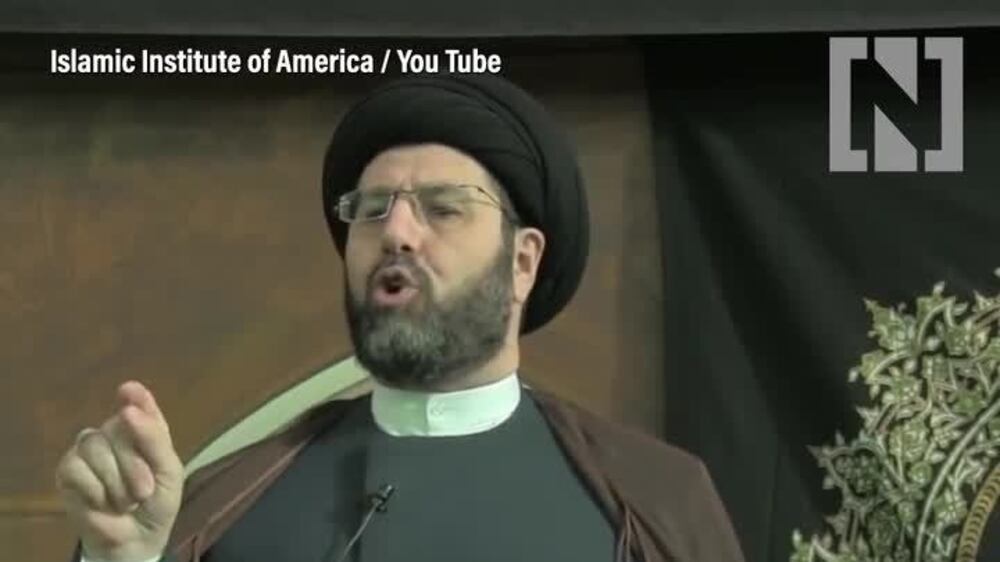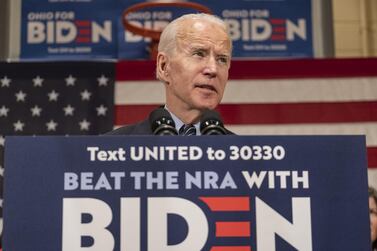The campaign of Bernie Sanders has scrambled to distance themselves from comments made by a pro-Iranian cleric who once said Israel had ties to ISIS after he addressed supporters of the Democratic nominee at a rally on the weekend.
The appearance on Saturday of Hassan Al Qazwini, an Iraqi-American Shiite cleric who leads the Islamic Institute of America in Michigan’s Dearborn Heights, sparked a backlash online, with commentators highlighting his numerous controversial speeches.
Mr Al Qazwini took to the stage on Tuesday at a rally held by the Democratic presidential nominee to urge Arabs and Muslims to vote for Mr Sanders.
“For the first time we find someone who defends our rights as Arabs and Muslims without discrimination,” said the Iraqi-American cleric, who was born in Karbala.
But in numerous videos of his sermons and speeches, Mr Al Qazwini has praised attacks on Saudi Arabia, linked ISIS to Israel and praised the Iranian regime.
In a speech in 2015, he said that the fact that ISIS had not carried out attacks in Israel showed that the two had ties and that “ISIS is playing the role of the arm of Zionists in the Muslim world.” The 2015 comments were just one of the several times he made similar claims.
More recently, he praised the September 2019 attack on Saudi oil facilities saying that the Iranian-backed Houthi rebels had taught a “lesson” to Riyadh.
The attack, which international experts have said could not have been carried out by the Yemeni rebels and instead pointed the finger at Iran, cut off nearly 50 per cent of global oil production for several days.
Addressing US and Saudi accusations that Iran was behind the attack, he said: “Let’s say, for the sake of conversation, that it is true that it is Iran. Do you blame Iran?”
On US politics, he said that US President Donald Trump also needed to “suffer the consequences” of withdrawing from the 2015 nuclear accord with Iran. The president withdrew from the Joint Comprehensive Plan of Action in 2018 and applied a maximum pressure campaign on Tehran to change its destabilising regional behaviour and not to develop nuclear weapons – a pursuit Iran says it has never undertaken.
But in the aftermath of the appearance, Mr Sanders’ campaign manager Faiz Shakir has apologised and sought to distance the candidate from Mr Qazwini’s previous remarks.
“The campaign has been made aware of offensive and toxic past statements by Imam Qazwini,” Mr Shakir told Washington Post columnist Josh Rogin. “These statements are dangerous, hateful, and violate the principles of our movement, which is based on values of equality and dignity for all people.
“Senator Sanders stands with those in Israel, Palestine, and across the region who work for peace, and unequivocally rejects anti-Semitic conspiracy theories that seek to blame Israel for all the region’s problems, and well as any bigoted statements against any group.”
After Mr Al Qazwini, veteran civil rights campaigner Jesse Jackson addressed the crowds in Grand Rapids in the state of Michigan, a hub of Arab migration to the United States.
Mr Sanders then spoke to supporters on the eve of the second major round of primary votes that will likely all but decide the Democratic nominee for the November election against Mr Trump.
Mr Sanders took an electoral hammering after initial wins in the contest. Former vice president Joe Biden on Tuesday won Michigan, expanding his delegate count and front-runner status against Mr Sanders.








